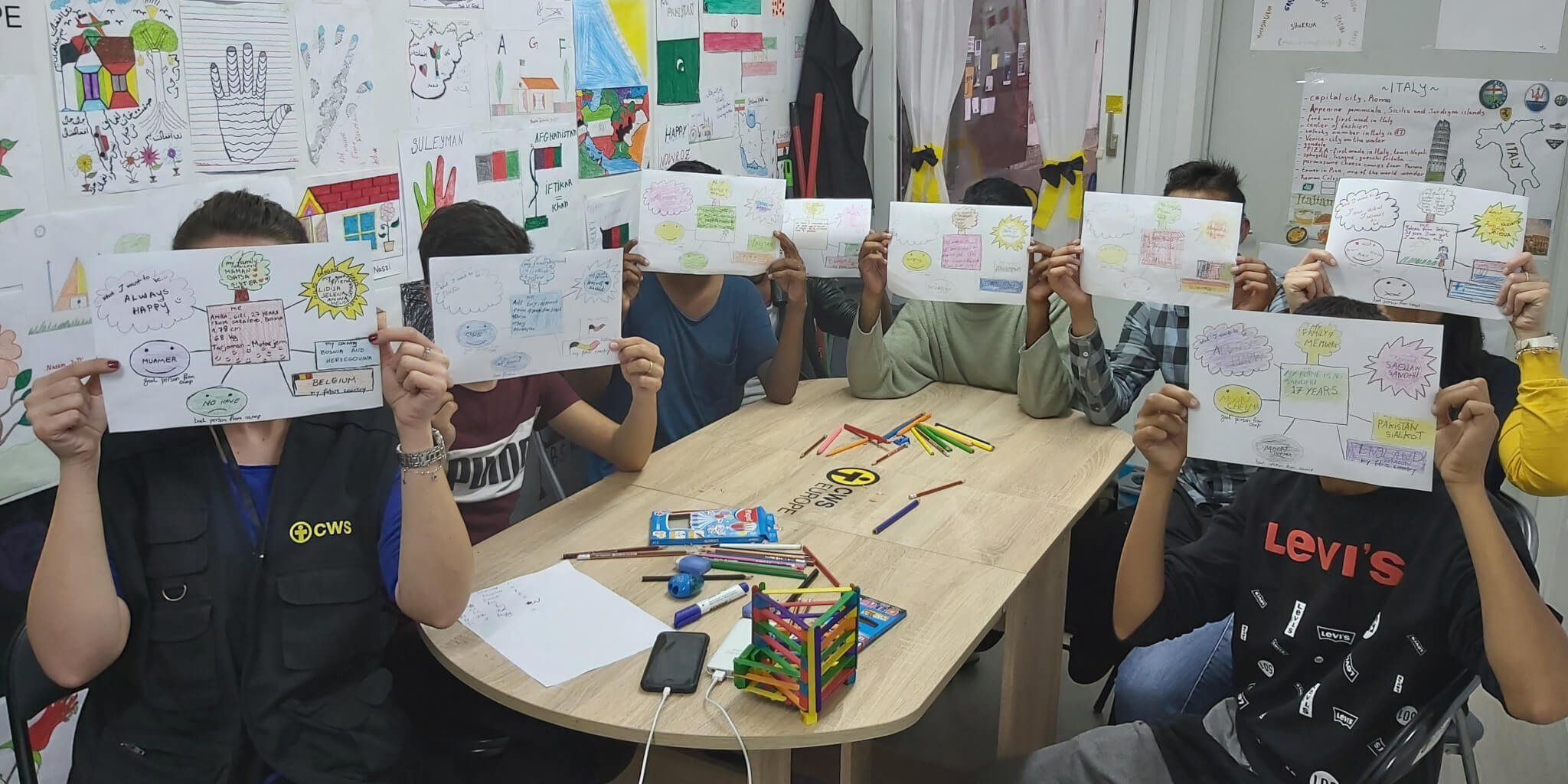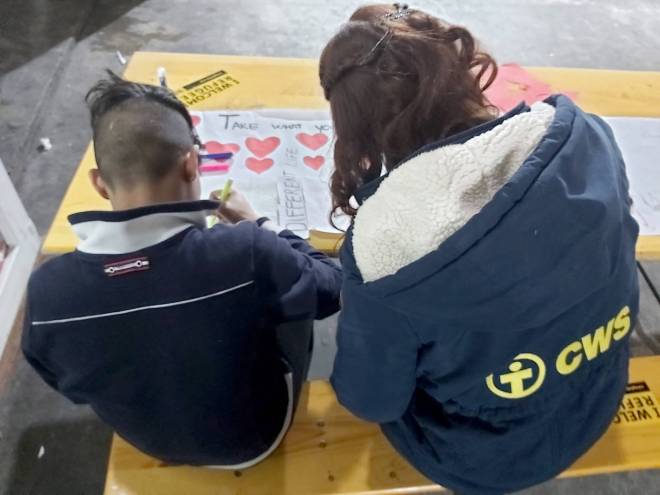
A CWS activities class with some of the unaccompanied youth sheltering in Bosnia-Herzegovina. PHOTO: CWS
By Christie R. House
June 17, 2021 | ATLANTA
Bosnia and Herzegovina (BiH) is located at a crossroad between Eastern and Western Europe. Since 2017, it has become a major artery for migrants hoping to enter the European Union from Pakistan, Afghanistan, Syria, Iraq, Iran and northern African countries. Approximately 18,000 people pass through BiH every year. Four centers receive migrants in Una Sana Canton in the northwest region of the country, the main reception area for new arrivals, including Unaccompanied and Separated Children (UASC). Four more centers are situated in other BiH cantons.
But before migrants enter Western Europe, they must first pass through Croatia, along BiH’s northern border. Though Croatia is a member of the European Union, it does not welcome migrants intending to cross its border.
“People that gather along the Croatian Border refer to crossing as ‘Going to the Game,’” noted the Rev. Jack Amick, director of the United Methodist Committee on Relief’s Global Migration program. He visited one of the reception centers to meet with staff of UMCOR’s partner, Church World Service. CWS, in partnership with the Social Welfare Center in Bihac, works with unaccompanied minors in receiving centers. While most of the youth are between the ages of 14 and 18, the staff has intervened for unaccompanied children as young as five and assists parents with younger children.
Many choose a particularly difficult path through the mountains of Croatia, hoping to slip by the border patrols, but the Croatian police take seriously their mandate to hold the border to the EU. Migrants who cross often return beaten and bruised, stripped of their possessions and dignity. They must recover in BiH before they try again.
Recognizing the needs of youth and children
UMCOR has supported the CWS program in BiH for several years with grants that help them undertake specific interventions for children and youth. Currently, CWS is utilizing a $50,000 grant to reach older boys along with other migrants, mainly men, who find themselves outside the reception centers. Warmer weather increases the chances for survival outside, but it also increases the number of new arrivals. Food packets, hygiene

supplies, clothing and masks are essential deliveries for CWS mobile teams checking on people, particularly youth, living in makeshift settlements.
Through a previous UMCOR grant in 2019, CWS worked in both Bira and Lipa to provide dedicated space for unaccompanied children, youth and young adults, providing a range of age-appropriate services. CWS staff members serve as official guardians for individual children, helping them access available health and social services. In 2020, when the reception centers were under lockdown because of the coronavirus pandemic, CWS activities with children and youth expanded to provide music lessons, language courses, art classes, sports and recreational activities inside the centers to help the youth and young adults through quarantine, which greatly relieved social pressure and improved mental health for all.
A familiar face in the forest
Often the mobile teams find young people they know when they encounter people living outside. Zindan (age 24) decided to stay in an improvised shelter close to the border as he prepared to cross, intending to reach one of the German-speaking countries. Zindan attended CWS programs and his favorite was German language class. One of the CWS guardians traveling with the International Organization for Migration team met Zindan during an outreach visit. Zindan recognized her immediately as his former German language teacher.
“We reminisced about the time he was coming daily to our workshops, and he wanted to know whether the reception centers would reopen and whether he would have a chance to come again to our classes,” the worker noted in her report.
Her outreach work remains critical and the only way to provide services for Zindan and other people who are stranded outside the receiving centers.
At the foot of Mount Pljesevica in Croatia sits a small tent settlement built on the Bosnia side by 15 people from Pakistan. All members of the group are men between the ages of 20 and 40. They have no electricity or water. They sleep in nylon tents on wet land each night. Here CWS workers find another familiar face, a Pakistani called Brko. He remembered CWS activities he attended in Bira, where he stayed until its closure for reconstruction.
Brko told CWS workers: “I often have the feeling that in the eyes of the local population I am seen as an animal. My biggest wish is to get to Italy to take a bath in a warm bathroom and spend at least one night in a dry and warm bed. Your support meant a lot to us in Bira, time passed more easily. I believe that you will help people outside equally well.”
Regardless of their situation, which is very difficult, the inhabitants of this improvised settlement still smile, ready to host and share what they have. Hot tea was served as the temperature dipped to 14°F that day. “The fact that they know that someone will visit them and make sure they are safe and well means a lot,” one of the CWS workers said. “It is a confirmation that they are still important to someone, enough not to lose faith in humanity, and the hope that one day, they too will be able to help those in need.”
Amick reflected: “Working with migrants, no matter what their situation, is an act of faith. We see just a glimpse of their journey. We don’t always know if they will get to their destination, but we help them the best way we can while we are with them.”
UMCOR’s work with refugees, asylum seekers and other displaced migrants needs your support. In honor of World Refugee Day, June 20, 2021, a gift to UMCOR Global Migration, Advance # 3022144 will help more people on their journey home.
Christie R. House is a consultant writer and editor with Global Ministries and UMCOR.

